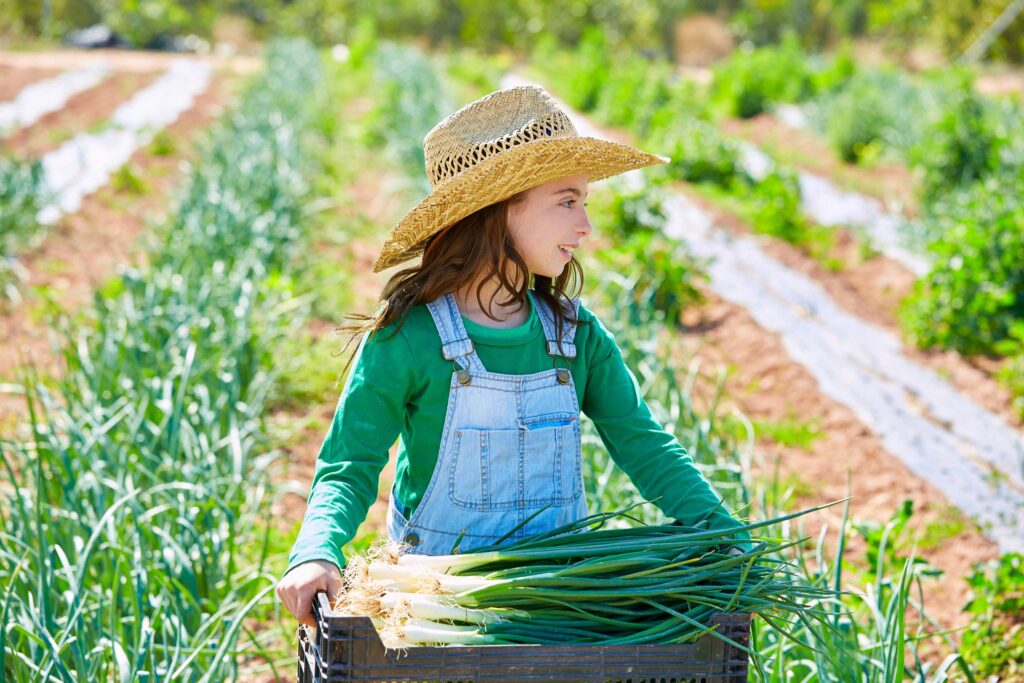Advertisement
Grow Kids’ Appreciation for Local Food
How nonprofits (like Fresh Roots) are solving an agricultural crisis

If you ate today, you can thank Canada’s farmers. Unfortunately, our farming is in peril as aging farmers retire. Meanwhile, experts warn that a lack of appreciation for where our food comes from is contributing to unhealthy eating and obesity. Thankfully, several organizations are working to reverse this trend, starting with kids.
Advertisement
The grass is older on the other side
Most farmers in BC are in their sixties, and less than 5 percent are in their mid-thirties or younger. We see similar trends in other Canadian provinces: more and more farmers are reaching retirement, and fewer young people are stepping into the gap.
When this happens, farmland is often sold for non-agricultural purposes such as residential neighbourhoods. Or, the farms are consolidated into sprawling corporate farms. Farm industry insiders in Europe, Asia, and the US report that this leads to more food insecurity, less biodiversity, and fewer local commodities. Big corporate farms tend to import supplies and sell their products outside of their local community.
Inspiring Canada’s children to get their hands dirty in community gardens and farms can strengthen our local agriculture and provide distinct health benefits to the kids involved. Community groups devoted to this are sprouting up across the country.
Advertisement
A fresh idea takes root
Fresh Roots, a nonprofit in Vancouver, celebrates ecological stewardship. It sees access to healthy land and fresh food as key to community health.
When asked about Canada’s aging farm population, director Marc Schutzbank compares the situation to learning a difficult classical music piece. “An expert pianist may practise a million times before a concert,” says Schutzbank. “In contrast, a Canadian farmer may only plant her crop 60 times in her lifetime.”
“That’s why the knowledge that gets passed down through a farmer is super significant,” explains Schutzbank. “How does the soil work? What happens in the particular contours of this piece of land? We need to ask: what can we do so that the knowledge that exists—that’s embedded in the DNA of these farmers—gets passed on?”
Fresh Roots’s specific focus is sharing the importance of Canadian farmers with youth by telling the story of where our food comes from. “Our role is to get people in an urban setting to say, ‘Hey, this is important, and as a result I choose to support our local farmers,’” says Schutzbank.
Without connecting these dots and building a relationship between the generations, we break the crucial chain of knowledge transfer from old to new farmers. “If we don’t have that knowledge, it’s like pulling the plug on a pianist,” says Schutzbank. “We just won’t have the knowledge or experience to play our piece.”
Advertisement
Extreme school makeover
In 2010, Fresh Roots built its first edible schoolyard at an elementary school. A few years later, the organization partnered with the Vancouver School Board to create Schoolyard Market Gardens.
These gardens were the first such project in Canada. Think of them as outdoor classrooms. Instead of school desks, students sink their hands and feet into the soil and learn about farming, cooking, and eating local produce. Workers and volunteers plant seeds of inspiration in students’ minds about the importance of sustainable, healthy food.
“Our farms are large-scale advertisements for kale and broccoli,” laughs Schutzbank. “Our goal (and what comes out in the research) is that when we spend time engaged in gardening, we eat more vegetables. We’re familiar with them. Our role at Fresh Roots—and at a lot of the organizations like ours—is to remind people that healthy food is easy.”
Advertisement
Growing health benefits
In just the past three decades, the rate of childhood obesity in Canada has gone up by 300 percent. Most of these kids will not outgrow the weight gain. This can lead to self-esteem issues, a higher risk of chronic diseases such as diabetes and high blood pressure, and even poor school performance.
Multiple factors influence childhood health, weight, and nutrition. Sometimes, it’s a lack of food education. Other times, it’s food insecurity, no access to healthy food, or not enough exposure to gardens and farms that would build an actual appreciation for healthy food.
Organizations such as Fresh Roots sit at this important crossroad of influences. “People don’t have a connection to our food system anymore,” says Schutzbank, “so we’re not choosing the right things to eat. And that has a huge impact on both physical and mental health.”
The Public Health Agency of Canada agrees: children who garden are healthier. In its recommendations for tackling childhood health and obesity, the agency recommends we increase our communities’ capacities for local food production and community gardens. This would expose more kids to agriculture. Fresh Roots and similar groups have seen first-hand how their projects positively benefit kids’ food choices, such as increased interest in eating vegetables.
“We just need a relationship with our vegetables,” says Schutzbank. “At one of the elementary schools, we had two little boys in grade 3 who’d never tried broccoli. [By the end of the year,] they were wrestling over who could have the purple broccoli.”
In addition to its school partnership, Fresh Roots runs a summer program where youth are hired to work on different farms and make healthy food for themselves and the community. “Some of these students have never really had vegetables at their table,” says Schutzbank. “They didn’t have the experience of owning their diet and well-being.”
Last summer, one such student discovered an affinity for local zucchini. She started making zucchini fritters and pastas to incorporate the veggie into her life.
Advertisement
A greener tomorrow
It’s not just the schools and children that benefit. Vegetables cultivated in Fresh Roots’s schoolyard gardens get served in BC restaurants and beyond.
“We often forget that farmers don’t sell just the food that you see at the grocery store,” says Schutzbank. He points to local jams and similar products that use Canadian ingredients. “A huge amount of stuff goes into the secondary cottage industry. How can we revitalize our food system and all the pieces that come with it? It starts with supporting our farmers.”
From a holistic perspective, Fresh Roots helps create green-collar jobs, promotes the significance of local food security, enhances community health, and makes school curriculums more engaging for kids. In the long term, experiential learning may one day help change Canada’s aging agricultural trajectory as more and more of our youth are exposed to the practicalities of what it takes to grow food.
Advertisement
Cultivating the future
As we discover the benefits of introducing children—and even ourselves—to gardening and growing fresh food, more of us want to get involved. “The first thing I would do is go outside and plant a seed,” suggests Schutzbank. “Try it for yourself and engage in your own food story.”
If that sprouts a passion within you, Schutzbank recommends connecting with one of the many like-minded organizations across the country. All of them appreciate volunteer time, donations, and other support.
Finally, buy local. “When you’re at the grocery store, think about supporting your local farmer,” says Schutzbank. None of this would be possible without Canadian farmers. Look for labels that designate locally produced products and try to shop at farmers’ markets.
“Let’s grow good food for all,” says Schutzbank. “That’s the big takeaway.”





